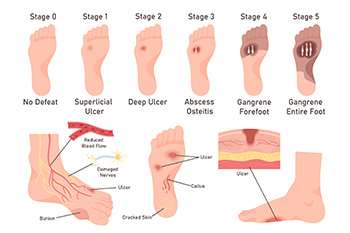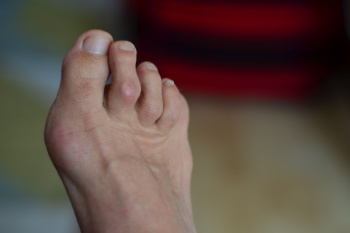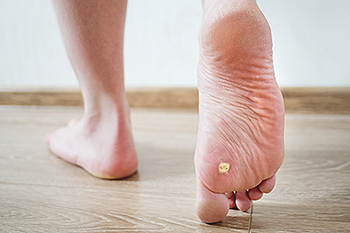Connect With Us
Blog
Items filtered by date: September 2024
Diabetic Foot Ulcers Cause Foot Pain

A diabetic foot ulcer is a serious complication of diabetes, characterized by a sore or wound on the foot that is slow to heal. These ulcers often develop due to poor blood circulation and nerve damage, common in diabetic patients. Risk factors include uncontrolled blood sugar levels, peripheral artery disease, and neuropathy, which diminishes sensation in the feet making injuries less noticeable. The progression of a diabetic foot ulcer typically begins with minor wounds or blisters that fail to heal properly. Over time, these can deepen and become infected, leading to more severe complications if not treated promptly. If you have developed a foot ulcer, whether or not it is related to diabetes, it is suggested that you are under the care of a podiatrist who can effectively treat this condition.
Foot Pain
Foot pain can be extremely painful and debilitating. If you have a foot pain, consult with Dr. Nicholas Przystawski from Central Florida Foot Care, PA. Our doctor will assess your condition and provide you with quality foot and ankle treatment.
Causes
Foot pain is a very broad condition that could be caused by one or more ailments. The most common include:
- Bunions
- Hammertoes
- Plantar Fasciitis
- Bone Spurs
- Corns
- Tarsal Tunnel Syndrome
- Ingrown Toenails
- Arthritis (such as Gout, Rheumatoid, and Osteoarthritis)
- Flat Feet
- Injury (from stress fractures, broken toe, foot, ankle, Achilles tendon ruptures, and sprains)
- And more
Diagnosis
To figure out the cause of foot pain, podiatrists utilize several different methods. This can range from simple visual inspections and sensation tests to X-rays and MRI scans. Prior medical history, family medical history, and any recent physical traumatic events will all be taken into consideration for a proper diagnosis.
Treatment
Treatment depends upon the cause of the foot pain. Whether it is resting, staying off the foot, or having surgery; podiatrists have a number of treatment options available for foot pain.
If you have any questions, please feel free to contact our office located in Leesburg, FL . We offer the newest diagnostic and treatment technologies for all your foot care needs.
What Is Hammertoe?

Hammertoe is a condition where one or more toes bend abnormally at the middle joint, resembling a hammer. This deformity often causes the affected toe to curl downward rather than lie flat. Symptoms include pain and discomfort, especially when wearing tight or ill-fitting shoes. Hammertoes also cause the formation of corns or calluses on the toe or the top of the joint as it rubs against the shoe. Hammertoe typically results from muscle imbalances or imbalances in the tendons that control toe movement. Contributing factors include wearing high heels or shoes with inadequate room for toes, genetic predisposition, and conditions such as arthritis or diabetes. If you notice signs of hammertoe, it is suggested that you promptly visit a podiatrist who can offer effective treatment solutions.
Hammertoe
Hammertoes can be a painful condition to live with. For more information, contact Dr. Nicholas Przystawski from Central Florida Foot Care, PA. Our doctor will answer any of your foot- and ankle-related questions.
Hammertoe is a foot deformity that affects the joints of the second, third, fourth, or fifth toes of your feet. It is a painful foot condition in which these toes curl and arch up, which can often lead to pain when wearing footwear.
Symptoms
- Pain in the affected toes
- Development of corns or calluses due to friction
- Inflammation
- Redness
- Contracture of the toes
Causes
Genetics – People who are genetically predisposed to hammertoe are often more susceptible
Arthritis – Because arthritis affects the joints in your toes, further deformities stemming from arthritis can occur
Trauma – Direct trauma to the toes could potentially lead to hammertoe
Ill-fitting shoes – Undue pressure on the front of the toes from ill-fitting shoes can potentially lead to the development of hammertoe
Treatment
Orthotics – Custom made inserts can be used to help relieve pressure placed on the toes and therefore relieve some of the pain associated with it
Medications – Oral medications such as anti-inflammatories or NSAIDs could be used to treat the pain and inflammation hammertoes causes. Injections of corticosteroids are also sometimes used
Surgery – In more severe cases where the hammertoes have become more rigid, foot surgery is a potential option
If you have any questions please contact our office located in Leesburg, FL . We offer the newest diagnostic and treatment technologies for all your foot and ankle needs.
Orthotics for Hammertoes

Orthotics are custom-made devices designed to support and align the foot, helping to relieve pain and discomfort associated with various foot conditions, including hammertoe. Hammertoe is a deformity where one or more toes bend abnormally at the middle joint, often causing pain and difficulty with footwear. Unlike splints, which are typically used to immobilize the toe to encourage straightening, orthotics are worn inside the shoe to redistribute pressure, cushion the foot, and improve alignment. Orthotics can alleviate the pain and discomfort associated with hammertoe by reducing friction and pressure on the affected toe, making walking and daily activities more comfortable. However, it is important to note that orthotics do not correct the deformity. They provide symptom relief and prevent the condition from worsening. Orthotics offer a non-invasive option to manage hammertoe symptoms effectively. For permanent correction, surgical intervention may be necessary. If you have a painful hammertoe, it is suggested that you schedule an appointment with a podiatrist to see if orthotics can help provide relief.
If you are having discomfort in your feet and would like to try orthotics, contact Dr. Nicholas Przystawski from Central Florida Foot Care, PA. Our doctor can provide the care you need to keep you pain-free and on your feet.
What Are Orthotics?
Orthotics are inserts you can place into your shoes to help with a variety of foot problems such as flat feet or foot pain. Orthotics provide relief and comfort for minor foot and heel pain but can’t correct serious biomechanical problems in your feet.
Over-the-Counter Inserts
Orthotics come in a wide variety of over-the-counter inserts that are used to treat foot pain, heel pain, and minor problems. For example, arch supports can be inserted into your shoes to help correct overarched or flat feet, while gel insoles are often used because they provide comfort and relief from foot and heel pain by alleviating pressure.
Prescription Orthotics
If over-the-counter inserts don’t work for you or if you have a more severe foot concern, it is possible to have your podiatrist prescribe custom orthotics. These high-quality inserts are designed to treat problems such as abnormal motion, plantar fasciitis, and severe forms of heel pain. They can even be used to help patients suffering from diabetes by treating foot ulcers and painful calluses and are usually molded to your feet individually, which allows them to provide full support and comfort.
If you are experiencing minor to severe foot or heel pain, it’s recommended to speak with your podiatrist about the possibilities of using orthotics. A podiatrist can determine which type of orthotic is right for you and allow you to take the first steps towards being pain-free.
If you have any questions please contact our office located in Leesburg, FL . We offer the newest diagnostic and treatment technologies for all your foot and ankle needs.
Heel Pain Can Be Treated!
Plantar Warts and Effective Relief Methods

Plantar warts are benign growths that appear on the soles of the feet due to an infection from the human papillomavirus, or HPV. They can cause discomfort and pain, making walking or standing difficult. These warts have a rough texture and can sometimes contain tiny black dots, which are small blood vessels. Various relief methods are available for those suffering from plantar warts. Mild treatments often include salicylic acid, which helps to peel away the wart gradually. Cryotherapy, which involves freezing the wart with liquid nitrogen, is another common approach. For persistent or severe cases, a podiatrist may recommend procedures like laser therapy or minor surgical removal. Plantar warts, which are both highly contagious and stubborn, can cause extreme pain and discomfort. If you have developed this type of wart, it is suggested that you consult a podiatrist who can offer you effective relief and treatment methods.
Plantar warts can be very uncomfortable. If you need your feet checked, contact Dr. Nicholas Przystawski from Central Florida Foot Care, PA. Our doctor will assist you with all of your foot and ankle needs.
About Plantar Warts
Plantar warts are the result of HPV, or human papillomavirus, getting into open wounds on the feet. They are mostly found on the heels or balls of the feet.
While plantar warts are generally harmless, those experiencing excessive pain or those suffering from diabetes or a compromised immune system require immediate medical care. Plantar warts are easily diagnosed, usually through scraping off a bit of rough skin or by getting a biopsy.
Symptoms
- Lesions on the bottom of your feet, usually rough and grainy
- Hard or thick callused spots
- Wart seeds, which are small clotted blood vessels that look like little black spots
- Pain, discomfort, or tenderness of your feet when walking or standing
Treatment
- Freezing
- Electric tool removal
- Laser Treatment
- Topical Creams (prescription only)
- Over-the-counter medications
To help prevent developing plantar warts, avoid walking barefoot over abrasive surfaces that can cause cuts or wounds for HPV to get into. Avoiding direct contact with other warts, as well as not picking or rubbing existing warts, can help prevent the further spread of plantar warts. However, if you think you have developed plantar warts, speak to your podiatrist. He or she can diagnose the warts on your feet and recommend the appropriate treatment options.
If you have any questions please feel free to contact our office located in Leesburg, FL . We offer the newest diagnostic and treatment technologies for all your foot and ankle needs.

